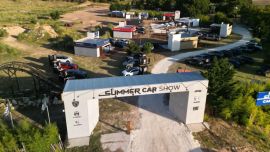Sitting on a table in Eduardo Elsztain’s office in Buenos Aires is a glass sphere filled with US$1 million in shredded, out-of-circulation US bills. The artwork, the real-estate mogul says, is a constant reminder of the worthlessness of fiat currency.
That lesson is nowhere more true than in Elsztain’s native Argentina and has led the protege of George Soros to build an empire of shopping malls, farmland, office space and even gold mines. The rule is clear: land, bricks and mortar.
“My theory for the last 20 years, since we’ve lived through crisis and the depths Argentina sank to in 2002, is that our defense against liquidity is real assets,” Elsztain said in an interview. “Once you print money, it’s a kind of a drug that you can’t let go of easily.”
Elsztain has avoided speculative investments in stocks, bonds and derivatives that have been hit by repeat Argentine defaults as he built up his empire over the last 30 years.
Now his real estate company IRSA Inversiones y Representaciones, which owns 15 malls in Argentina, is booming even as the economy enters its sixth recession in a decade and inflation runs at more than 120 percent, driven in part by the government printing money en masse to finance its spending.
IRSA’s revenue surpassed pre-pandemic levels in the last fiscal year thanks to a bump from tourists filling its shopping malls and hotels. Earnings before interest, taxes, depreciation and amortisation jumped 25 percent in the 2023 fiscal year from the previous 12 months, according to its annual report.
Activity from IRSA’s stakes in three hotels, including the exclusive Llao Llao in Bariloche, also performed well in the past fiscal year.
Sound advice
Elsztain bought IRSA in 1991 with then-partner Marcelo Mindlin to gain access to Argentina’s capital market. He later designed his strategy after receiving some sound advice from an influential rabbi: get out of speculative assets.
That led him to approach Soros, who granted him US$10 million to invest in Argentine real estate, which Elsztain says generated a triple-digit return in less than a year. In 1994, he purchased rural real-estate firm Cresud, which would become his main holding. Cresud controls 27 farms in Argentina, Brazil, Bolivia and Paraguay — including a wool ranch in Patagonia — that span some 850,000 hectares — over twice the size of Rhode Island.
But it’s the malls that are proving a boon at the moment, even as their counterparts in the US struggle. Take a stroll through Buenos Aires’ Alto Palermo mall, where wealthy shoppers snatch up the latest fashions, and you’ll see his malls are operating at 98 percent capacity.
Sales grew 16 percent in real terms in the last fiscal year from 2022 at IRSA’s malls nationwide.
Elsztain says Argentina’s shopping frenzy is partly due to a post-pandemic boom in tourism, pent up demand, and high inflation that drives people to spend their pay-cheques quickly before prices surge again.
The optimist
Now, as Argentina slogs through yet another crisis, Elsztain is turning optimistic. Things have gotten so bad, he says, that the nation is likely to vote in a business friendly administration in October’s elections, ushering in an economic boom.
“In 40 years of democracy we’ve never had candidates that have been more pro-market,” Elsztain said.
The frontrunner, libertarian outsider Javier Milei, aims to dollarise the economy and shutter the Central Bank. His closest competitor, Patricia Bullrich, is a hardliner from the market-friendly opposition coalition. Even incumbent Economy Minister Sergio Massa, whose coalition lagged in the August primaries, is seen tacking right if his party were to remain in power.
“I think more money will be coming than going,” he said. “Argentina has a tremendous amount of investments to be developed that are stopped because of a lack of liquidity, a lack of credit and the lack of a financial system.”
Soros protégé
Today, Elsztain’s 37 percent stake in Cresud is worth about US$140 million at Argentina’s widely-used parallel exchange rate, and through Cresud he controls IRSA, mortgage lender Banco Hipotecario and Brazilian farm company BrasilAgro.
He also has a majority stake in miner Austral Gold which is listed in Australia and has assets in South America, as well as a small stake in a Canadian software company.
To be sure, Elsztain’s investments have had their share of bumps. An attempt to restructure a major Israeli holding went sideways in 2020, with Elsztain losing control of Discount Investment Corp. IRSA also felt the effects of workers’ slow return to offices after the pandemic, prompting the company to sell more than $250 million worth of office space in Buenos Aires, said Sergio Dattilo, a spokesman for Elsztain.
IRSA sees commercial real estate heading toward flexible working arrangements, and Elsztain is already investing in co-working spaces adjacent to his malls. IRSA is also close to breaking ground on its “most ambitious project ever,” a large swathe of old docks called Puerto Madero Sur that will require investment over the next 20 years and will eventually house about 6,000 families, commercial space, hospitals and parks.
“People would ask my grandfather, how do you know you’re doing well with out of control inflation? He’d say: I want to know if I have one square metre, one more hectare of farm or one more parking space.”
related news
by Scott Squires & Daniel Cancel, Bloomberg




















Comments